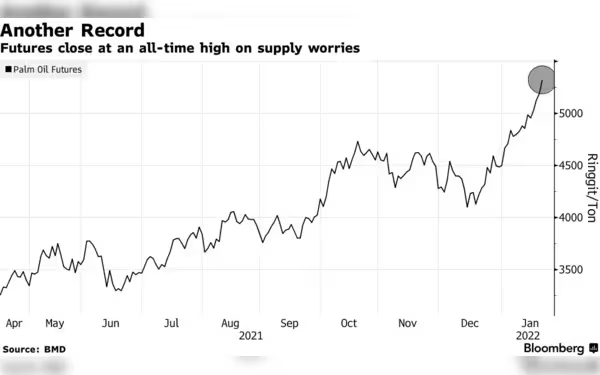Thursday, July 4, 2024 07:29 PM
Malaysian palm oil futures drop due to oversupply concerns
- Malaysian palm oil futures decline over 1% following weakening Chicago soyoil prices
- India's palm oil imports in March hit a 10-month low due to higher prices
- Malaysia's palm oil inventories expected to reach an eight-month low by end of March
 Image Credits: Bloomberg
Image Credits: BloombergMalaysian palm oil futures drop due to oversupply concerns, influenced by weakening Chicago soyoil prices and reduced India imports. Malaysia's palm oil inventories expected to reach an eight-month low by end of March.
Malaysian palm oil futures experienced a decline of over 1% in early trading on Friday, following a trend of weakening Chicago soyoil prices attributed to increased supplies. This drop was also influenced by a reduction in India's palm oil imports during March. The benchmark palm oil contract for June delivery on the Bursa Malaysia Derivatives Exchange fell by 70 ringgit, equivalent to 1.64%, settling at 4,247 ringgit per metric ton during the initial trading session.
Soyoil prices on the Chicago Board of Trade saw a 0.2% decrease on Friday, following a significant 3.2% decline the day before. India's palm oil imports in March hit a 10-month low due to higher prices, leading refiners to opt for sunoil instead, resulting in a surge in sunoil imports to near-record levels.
Meanwhile, Malaysian palm oil product exports for the initial 10 days of April rose by 12.7% compared to the same period in March, as reported by cargo surveyor Intertek Testing Services. The US Department of Agriculture maintained its forecast for Brazil's soybean crop at 155 million metric tons, while Brazil's Conab revised its output projection downwards to 146.522 million metric tons due to adverse weather conditions.
Argentina's Buenos Aires grains exchange also lowered its harvest estimate for the 2023/24 soybean crop, citing dry weather impacts. Additionally, Malaysia's palm oil inventories are anticipated to have decreased by 6.65% to reach an eight-month low of 1.79 million tons by the end of March, according to a Reuters survey.
Looking ahead, palm oil prices may revisit the support level at 4,274 ringgit per metric ton, with analysts suggesting that the decline from 4,443 ringgit appears to be incomplete. The market continues to be influenced by various factors, including supply dynamics and weather conditions in key producing regions.













